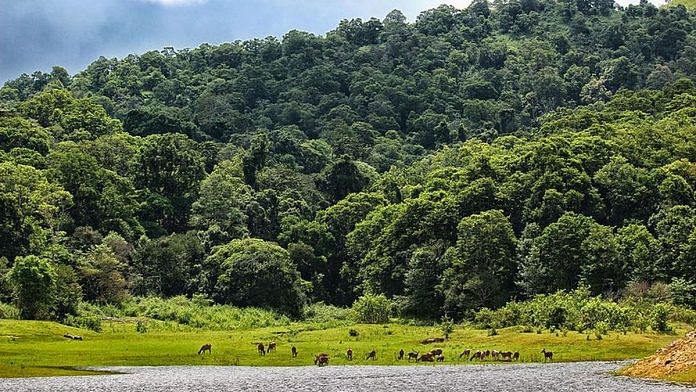We drive on the forest road for about 5 kilometres from the Vallakadavu forest check post to reach the Vanchivayal tribal settlement situated inside the Periyar Tiger Reserve.
Vanchivayal is perhaps the richest tribal colony in the entire Western Ghats region, with every family earning Rs 4–5 lakh annually through the cultivation of organic pepper and coffee, which are exported to European countries. Every family here owns a two-wheeler or a car. Their children go to English-medium schools. Many of them are engineering graduates, government employees and technicians, all because of the income from the cultivation of organic pepper over the past two decades. These families, which belong to the Oorali tribal community, shifted from the core area of the Periyar Tiger Reserve to the buffer zones seventy- two years ago. The families initially started cultivation of tapioca, paddy and millet, but due to relentless interference from wild animals which raided their crops, they almost stopped the cultivation of food crops.
‘For several years, they were in a really bad shape. The forest department then mooted the concept of organic pepper cultivation. They were told that pesticides and chemical fertilizers should not be used for the crops as their land was within the forest. The tribals were given the rights over the forest land for cultivation under the Forest Rights Act. On average, around 25–30 tonnes of organic green pepper are cultivated in 40.2 hectares of land,’ says P.N. Sebastian, Eco Development Committee (EDC) facilitator, Vallakadavu.
Also read: Eight states tell Supreme Court they wrongly rejected claims of tribals over forest land
The eighty-two tribal families have now shifted to biodynamic farming and their produce has great demand in European countries. ‘For us, it was an easy transition because we anyway see the entire ecosystem as having a mystical cosmic energy. When we were told to undertake farming according to the planting calendar, it was an easy shift for us,’ says J. Ramani, a pepper farmer.
Interestingly, more tribal women than men are into farming here, climbing the 20-foot ladder to pluck pepper from creepers that grow up tall poles. ‘It was only due to the income from pepper that we could afford to provide a good education to our children. My elder daughter joined the Government Engineering College in Thiruvananthapuram, while my younger daughter is doing her graduation in medical laboratory technology,’ Ramani says. I ask them if there were landslides within their locality in the forest during the floods in 2018 and they say there was not a single landslide here, underscoring the importance of the thick canopy of trees which can hold the earth on the slopes. ‘There were no landslides but we were isolated for many days due to the heavy rains—the bridge over the Periyar river inside the forest was flooded,’ V. Thankappan says.
The tribal community is now planning to diversify their farm produce by exporting wild turmeric and ginger. ‘We have produced 1600 kilograms of turmeric and bagged an order from Germany,’ Sebastian says. He says that a few years ago, the EDC got an order from a foreign country to make bamboo baskets as they had expertise in that craft. But a majority of them rejected the proposal because they felt it was part of a backward ‘tribal’ culture. Their settlement was called Ooralikudi (the homes of the Oorali) till a few years ago. But the community dislikes the name as it feels that it is used against it as a casteist slur and prefers to call the place Vanchivayal.
 This excerpt from Flood and Fury: Ecological Devastation in the Western Ghats by Viju B. has been published with permission from Penguin Random House India.
This excerpt from Flood and Fury: Ecological Devastation in the Western Ghats by Viju B. has been published with permission from Penguin Random House India.




Great article…relocation is win win solution…people come in mainstream